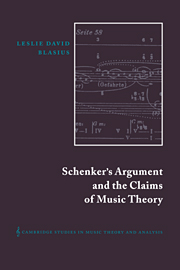I - The appeal to psychology
Published online by Cambridge University Press: 28 October 2009
Summary
A NEW PROGRAM FOR MUSIC THEORY
Schenker moves most decisively in the preface to Harmony (1906) to differentiate his work from that of his contemporaries. We are given to understand that his treatise alone is not a low-grade compositional primer but rather a study of the abstract forces underlying music, an investigation of “a purely spiritual universe, a system of ideally moving forces” in which all considerations of voice-leading are to be held in suspension. Thus passages from the masterworks will be correctly interpolated into the text not as exemplary compositional exercises but as phenomenal evidence of the workings of abstract musical laws, and the accustomed division of the harmony treatise into a theory of harmonic analysis and a practice of harmonic voice-leading will give way to a more insightful division between a theory of atemporal tonal systems and a practice of harmonic succession.
Familiar as we have become with the tenor of Schenker's entire corpus, this program and its realization in the body of Harmony may not strike us as radical, and looking even beyond Schenker's own claims, it takes a certain effort for us to recognize that through his abstraction of an essentially conservative harmonic theory he rather spectacularly recuperates two major strands of late nineteenth-century music theory – the pedagogic and the speculative.
Still, one particular usage appearing in both the preface and the body of Schenker's text strikes us as curious.
- Type
- Chapter
- Information
- Schenker's Argument and the Claims of Music Theory , pp. 1 - 35Publisher: Cambridge University PressPrint publication year: 1996



